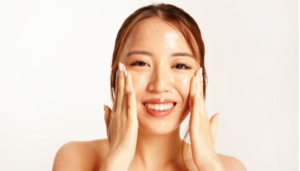Hello gorgeous!
I have a question for you – can you easily distinguish the exact difference between the two terms – skin type and skin concern? These two names are frequently fluxed.
For an instance, if I notice any breakout or acne on my skin, you might assume that I have oily or acne prone skin. But that’s not true! I have extremely dry skin & acne can be a temporary skin concern which can be due to any external factor, upset stomach or hormonal change. And with this misconception we usually start using oil control products, which might not be suitable as per our skin type. And then we also end up making an inaccurate judgment about our true skin condition. That’s why knowing your unique skin type is very important as each ingredient reacts differently with different skin types.

The word “skin type” refers to the nature of your skin. It speaks of the inherent qualities of your skin that are mostly inherited from your parents, or skin changes we face with age or due to various environmental factors. We can classify skin type under four categories:
A healthy ratio of water to oil is present in normal skin, and there aren’t many problems like dryness or overly oily skin. It’s even skin with less pores and good elasticity.
Dry skin has a tight, gritty appearance and is characterized by a lack of moisture, tight pores & more visible fine lines. It could appear drab and crumbly. Like I have extremely dry skin. And it becomes stretchy and super dry immediately after washing my face.
The overproduction of sebum, which results in glossy skin and increased pores, is the hallmark of oily skin. Acne and outbreaks are more likely to occur on oily skin.
A blend of various skin types is known as combination skin. It is distinguished by certain regions of oily skin such as T-zone, larger pores around the T-zone, more prone to blemishes around oilier areas.
Conversely, skin concerns are specific problems or conditions that can affect any type of skin. These worries may consist of:
1. Acne: Distinguished by the appearance of whiteheads, blackheads, and pimples, acne may result from bacterial growth, clogged pores, or excessive oil production.
2. Hyperpigmentation: This is the term for dark patches or blotches on the skin, frequently brought on by hormone fluctuations, post-inflammatory pigmentation, or UV damage.
3. Dryness: Age, the environment, or a lack of moisture can all contribute to dry skin. It may result in pain, itching, and flakiness.

5. Aging: As we get older, our skin naturally changes in ways including fine lines, wrinkles, sagging of the skin and the loss of elasticity.
4. Sensitivity: Skin that is sensitive is readily irritated and might respond to specific substances or surroundings by becoming red, itchy, or burning.
So, in short, always distinguish between the two and choose the right product with the right ingredients to treat these temporary skin concerns.
Let’s be naturally beautiful together and keep in touch.
Gunjan







+ There are no comments
Add yours